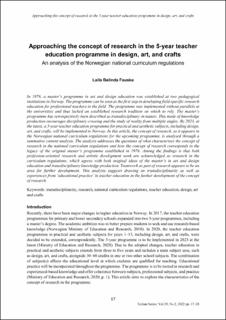Approaching the concept of research in the 5-year teacher education programme in design, art, and crafts An analysis of the Norwegian national curriculum regulations
Peer reviewed, Journal article
Published version
Permanent lenke
https://hdl.handle.net/11250/3059943Utgivelsesdato
2022Metadata
Vis full innførselSamlinger
Originalversjon
https://doi.org/10.7577/TechneA.4720Sammendrag
In 1976, a master’s programme in art and design education was established at two pedagogical institutions in Norway. The programme can be seen as the first step in developing field-specific research education for professional teachers in the field. The programme was implemented without parallels at the universities and thus lacked an established research tradition on which to rely. The master’s programme has retrospectively been described as transdisciplinary in nature. This mode of knowledge production encourages disciplinary crossing and the study of reality from multiple angles. By 2023, at the latest, a 5-year teacher education programme for practical and aesthetic subjects, including design, art, and crafts, will be implemented in Norway. In this article, the concept of research, as it appears in the Norwegian national curriculum regulations for the upcoming programme, is analysed through a summative content analysis. The analysis addresses the questions of what characterises the concept of research in the national curriculum regulations and how the concept of research corresponds to the legacy of the original master’s programme established in 1976. Among the findings is that both profession-oriented research and artistic development work are acknowledged as research in the curriculum regulations, which agrees with both original ideas of the master’s in art and design education and transdisciplinary knowledge production. Teamwork as part of research appears to be an area for further development. This analysis suggests drawing on transdisciplinarity as well as experiences from ‘educational practice’ in teacher education in the further development of the concept of research.

